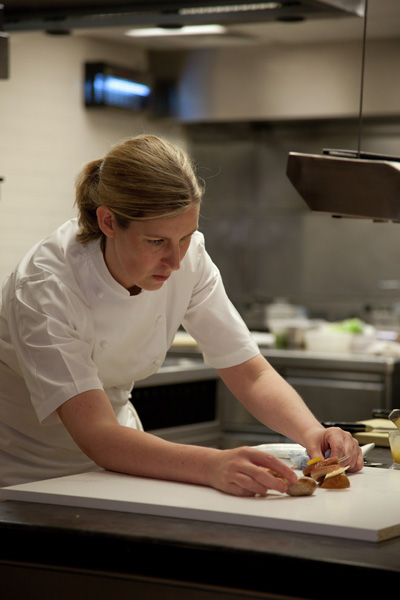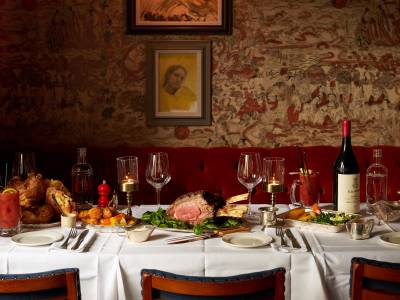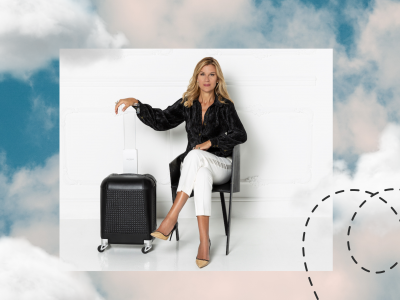Being a top chef has never been so good. Capital cities around the world are crammed with cooking legends, from Koffman to Keller, Ramsay to the Roux brothers, Blumenthal to Boulud. But where are all the women? Figures from the Office for National Statistics show that of the UK’s 187,000 chefs, 37,000 are women, making up just 20 per cent of the total. And at the very top—at head and executive chef level—women are a rarity.
The rise of female Michelin star chefs
13th January 2013
Name three top chefs and they’ll probably be male, but female chefs on tv are finally rising through the culinary ranks. Fiona Sims meets the female chefs spearheading change in the world’s top kitchens
The Best New Chef lists created by US magazine Food & Wine have featured 92 men and 11 women in the past 10 years, and while a record-breaking 11 women won Michelin stars in the UK in 2011, that compares to a total of 143 Michelin-starred restaurants.
It was partly this lack of women at the top that prompted myself and Angela Hartnett, chef and owner of London’s Michelin-starred Murano, to set up Girls’ Night Out, a celebration of those few women who have made it. For three consecutive nights, we teamed up three leading British-based chefs with three equally stellar female chefs from overseas.
In between courses, I asked them about their own individual paths through the professional kitchen and the challenges facing female chefs today.
Angela Hartnett
Murano, London
Hartnett has emerged as one of Britain’s most successful, best-loved and Italian TV chefs, female. In 2002, she opened Menu Restaurant at the Connaught hotel with Gordon Ramsay—the first woman ever to run the kitchen there—and her efforts were recognised in 2004 when she got her first Michelin star.
In January 2007, she was awarded an MBE for services to the hospitality industry and soon after published her first book, Angela Hartnett’s Cucina: Three Generations of Italian Family Cooking (Ebury), which became a bestseller. In 2008, Hartnett and Ramsay opened Murano in Mayfair, serving modern cuisine with an Italian accent, reflecting Harnett’s family roots, winning a Michelin star the following year.
She became the sole owner of Murano in October 2010, is currently a columnist for The Guardian and now also oversees the Whitechapel Gallery’s Dining Room.
I give the same advice to any chef, regardless of gender: choose your style and do your best
“Men dominate most industries, get over it and get on with it, I say. There’s no point in me trying to square up to a bloke, you’ve just got to be smarter about things. I’ve lost my rag in the kitchen, certainly, but I get annoyed when I do. I feel like I’ve lost control.
“I don’t think women have had to work any harder at this job, and they don’t run kitchens any differently to men—we have just as much stamina as men. I think if anything it’s easier for a woman in this industry.
Women stand out more—I’m sure I’ve had more articles written about me just because I’m a woman. My advice to any woman wanting to enter this profession is to believe in your cooking and don’t take the option of the pastry section, which seems to be what happens all too often.
And I give the same advice to any chef, regardless of gender: choose your style of food and do the best that you can, whether it’s fine dining, turning out burgers or making pizza. “I think the industry is so much better these days in every aspect—the money is better than it used to be, so are the hours, and there is far less attitude and aggression in the kitchen to deal with.”
Gabrielle Hamilton
Prune, New York
Hamilton opened Prune in New York City’s East Village in October 1999 and has since been regularly cited in the top 100 lists of all major food magazines.
She has made numerous television appearances and most notably was the victor in her Iron Chef America battle against Bobby Flay on The Food Network in 2008. Hamilton is also a prolific writer, contributing to many different publications from The New Yorker to Food & Wine magazine.
She has also been nominated for Best Chef NYC in 2009 and 2010 by the James Beard Foundation and in 2011 won the category. Most recently, she is the author of the New York Times bestseller Blood, Bones & Butter: The Inadvertent Education of a Reluctant Chef, her no-holds-barred memoir. “Does the industry give famous female cooks enough recognition?
No, it doesn’t. But then I don’t want recognition just because I’m female. I want it because I’m doing a great job. I think one of the problems is that there are hardly any professional female chefs on television. It’s either domestic cooks wearing sweater sets with long lacquered finger nails or it’s female Iron Chefs commencing battle—it’s so messed up.
I have encountered my share of chauvinism. Not grossly overt sexism—that I can easily dismiss, as it says more about them than me.
"No, this is quiet, not explicit: condescension, dismissal, disregard. It was draining and almost a second job to be mentally pre-occupied with what’s going on in the kitchen. But I stayed focused on what’s important, put my head down and got on with doing my job. Even now, with my position as a chef ‘in the club’, I still feel it. It rattles you, right? But many more chefs praise me, so I turn down that negative noise.
“How do I juggle life with my two kids? To be honest, it’s a nightmare. Everyone gets hurt, not least me—the babysitter knows my kids better than me. The clever way to approach this is to do things in succession—jump on the career path early and have kids later if you want them, though I know life doesn’t work out that way sometimes. I have many women working with me in the kitchen. Though I like it best when it’s a mix: too many women and it’s a hair parlour; too many men and it’s a saloon.”
Anna Hansen
The Modern Pantry, London
Born in Canada and raised in New Zealand in a family peppered with Danish culinary influence, Hansen got a degree in business and then embarked on a culinary tour of India and Thailand before landing in London in 1992, where she worked at Fergus Henderson’s French House Dining Room.
In 1998 Anna took up the role of pastry chef at Peter Gordon’s Soho restaurant, The Sugar Club. Two years later, she launched the award-winning The Providores and Tapa Room.
Hansen opened her first solo venture, The Modern Pantry, in August 2008 to rave reviews and is well known for her use of exhilarating ingredients and exciting flavour combinations. She published her groundbreaking cookbook, The Modern Pantry (Ebury Press), in May 2011.
If men really want to play that role and carry that heavy stockpot, they can go right ahead
This year, she was awarded an MBE for her contribution to the industry. “At certain times I felt like I was being patronised, yes, but it often worked to my advantage. If men really want to play that role and carry that heavy stockpot, then they can go right ahead—I’m not going to stop them.
“I have two women working in my kitchen at the moment, though I’ve had many more in the past, but right now that’s just the way it is. I do see plenty of female chefs around now, however, and I’ve come across more and more in the past couple of years. I think it helps that people are behaving a lot better in kitchens these days.
They are definitely less hostile places than they used to be, which is great —it shows we are evolving as a human race, though female chefs still aren’t getting enough recognition.
I’m not sure why exactly. It could be as simple as: it’s interesting if you’re a man and you can cook, right? We need more professional female chefs on television, certainly. As great as all those guys are—Hugh, Heston, Jamie, etc—we could do with a different perspective.”
Helena Rizzo
Maní, São Paulo
Born in Porto Alegre, south of Brazil, Rizzo discovered her passion for food when she moved to São Paulo at the age of 14 to pursue a modelling career.
But cooking for friends awakened her real interest, so she worked her way around top kitchens in the city before heading to Europe’s Michelin-starred establishments to hone her skills further.
She ended up at renowned Spanish restaurant El Celler de Can Roca (currently awarded three Michelin stars) with chef Joan Roca, one of her great mentors. It was while working with Roca that she met her husband, Catalan chef Daniel Redondo, with whom she now shares the kitchen of her São Paulo restaurant, Maní, which opened in 2006.
Her cuisine blends Spanish and Mediterranean techniques with Brazilian tradition such as tucupi bobó, made with grilled shrimp, carrot, palm oil and cashew nuts. She has also picked up countless prizes, including Best Chef of the Year from Veja, Brazil’s top-selling news weekly—the first woman to receive this title in the history of the award.
“Half the people who work for me are women, both in the kitchen and on the floor. But that’s not so unusual in Brazil. It’s been like that here for the past decade or so. Anyway, I think having both women and men in my kitchen is healthy—it’s more balanced. In my experience, there’s no difference between men and women when it comes to the quality of their work. It depends on the person, not their gender.
I’ve worked in kitchens for over 15 years and yes, I’ve encountered a certain amount of chauvinism. But in every kitchen you get the good and the bad, right? “I don’t feel that talented female chefs are recognised enough in this industry—they aren’t valued, certainly. My husband Daniel shares the head chef duties with me though we always work separate shifts—it’s better for our relationship!”
Clare Smyth
Restaurant Gordon Ramsay, London
Smyth is the head chef at three Michelin-starred Restaurant Gordon Ramsay—the first and only female chef to run a restaurant with this accolade in the UK.
Born in Northern Ireland, she moved to England at 16 to learn the skills which would eventually make her a world-class chef. On completing her studies, Smyth’s thirst for knowledge drove her to work under many influential TV chefs, female around the world.
In 2002, she joined Restaurant Gordon Ramsay and worked her way up the ranks to become senior sous chef, leaving London again in 2005 to gain experience abroad, joining the hallowed kitchens at Alain Ducasse’s renowned Le Louis XV in Monte Carlo.
Soon after returning to London and Restaurant Gordon Ramsay, she was promoted to head chef in 2008. “Yes, it has been a challenge. Being a chef is a hard, dirty, job, and many drop out, but when you’ve gone through the toughest kitchens there are, you come out the other side.
And yes, I’ve encountered chauvinistic behaviour—I think there’s a bit wherever you go. I’ve had my fair share of ‘little girl, you don’t belong here’—in France particularly. But it takes about five minutes to prove that this isn’t a joke and you are serious about what you do, and then you just get on with it. I think, generally, women are better at this job—there is less nonsense, they have more stamina, and higher pain thresholds.
Women, moody? Seriously? I work with 15 guys and they are up and down all the time, it makes me laugh. “One of the most annoying things I’ve ever been told is ‘you’ve done well for a woman’.
I find that insulting. I’m good at what I do regardless of my gender. There are some great female chefs all over the world but the majority of the public don’t know who they are. One answer is to get more female TV chefs and in print.
The dominance of female domestic cooks on our screens is quite unnatural—pretty girls making cookies is the wrong image. What next for me? I’ve achieved all I want in culinary terms—I’ve got the T-shirt. But in a business sense I haven’t yet. If I do have kids, I want to be able to provide for them myself and not rely on anyone else.”
Margot Janse
The Tasting Room at Le Quartier Français, Franschhoek, South Africa
Janse is the executive chef at the Relais & Châteaux-annointed Le Quartier Français hotel in Franschhoek. Born and educated in The Netherlands, her creative talents were evident right from the start, and her tertiary studies included drama and photography.
However at the age of 23 the kitchen beckoned and she approached Ciro Molinaro, a highly respected Johannesburg restaurateur, who agreed to teach her in his own kitchen.
Two years later, in 1995, Janse joined the culinary team at Le Quartier Français and quickly worked her way up to the top. She travels extensively to stay abreast of emerging trends and gather ideas, and has received numerous accolades from some of the world’s most respected publications including a position in San Pellegrino’s World’s 50 Best Restaurants awards.
She has also been voted number one chef in South Africa. “I can’t say I have experienced a lot of chauvinism in this job, but maybe I’m not open to it. I started my cooking career in Africa, and a lot of women work in this profession here, though I have worked in plenty of European kitchens, too.
I get a certain vibe sometimes, but I don’t know if that’s because of who I am, or because I’m a woman. “There aren’t many women at the top in this profession, but that’s not because they can’t do it, it’s because at some point they might become a mother. I have a son, and it’s hectic.
But I can do it because of where I live and who surrounds me. I’m part of a large female team in the kitchen. Out of 28 staff, 18 are women. I never planned it that way, it just happened.
There’s an enormous amount of self-discipline in my kitchen but it’s important that you enjoy the work—we have the music pumping, we have a lot of fun. “Do we get enough recognition? I don’t want to go there—women have their strengths and so do men.
What I do say to any woman who wants a career in this industry is that you have to be tough, you have to fight your battles, you have to fight hard to be taken seriously—not with male chefs, in my experience, but with the guys who repair the stove, fix the equipment, and with your suppliers.
And yes, maybe I do get labelled the difficult chick, but I have no illusions—it’s still a boy’s club and the guys stick together. You’ve just got to elbow your way in and it’ll be fine.”











